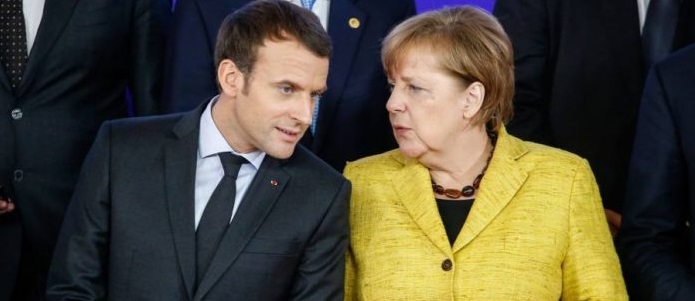Eurozone budget idea cools
August 30, 2018 | Expert Insights

Berlin is no longer enthusiastic about President Macron’s suggested EU policy to formulate a single budget for the Union.
Background
The Eurozone (officially called the Euro area) denotes the 19 of the 28 European Union (EU) member states that have adopted the Euro as their common currency. It was established in 1999 and its GDP as of 2016 stood at $11.8 trillion.
According to data from the Eurostat, the 19 members, part of the Eurozone, saw their growth accelerated by 0.6% in the three months to June 2017. The year-on-year growth has increased to 2.1% as compared to 1.9% from the same quarter last year. This is the best number the region has seen in the past five years. Forecasts have also been bullish regarding the growth of the bloc in the near future. The IMF has said that the Eurozone GDP will grow by 1.7% in 2018.
In addition, the Eurozone has been dealing with the consequences of the Greek debt crisis in the past years. Unable to sustain itself having joined the Eurozone in 2011, Greece’s trade deficit increased, and its unemployment rate rocketed to 25%.
French President Emmanuel Macron had earlier suggested a deeper integration of the Eurozone by establishing a common budget for its members. German Chancellor Angela Merkel was on board with the idea, but it looks like the proposal is losing steam.
Analysis
Germany is cooling on the idea of a eurozone budget, one of French president Emmanuel Macron’s central demands, saying priority should be given to other initiatives to boost the currency bloc’s resilience.
The tougher German line is bad news for Mr Macron, who has made a common pool of money for the single currency area a central plank of his EU policy.
The French president has argued for a permanent “fiscal capacity” that would be financed by national contributions and also, potentially, new EU taxes and levies. It would be used to foster growth and competitiveness in the currency bloc and to stabilise countries hit by economic shocks.
Mr Macron has said that this budget should be equivalent to several percentage points of the eurozone’s gross domestic product, so running into hundreds of billions of euros.
France has made clear that its plans are fundamentally different to the EU budget, which totals about 1 per cent of the bloc’s GDP, and which is largely made up of seven-year spending programmes covering everything from agricultural subsidies to scientific research.
However, it appears Germany’s priority will be to look at more targeted initiatives in the EU’s next multi-annual budget that could help countries in difficulties. One such proposal, made by German finance minister Olaf Scholz, is for a “reinsurance fund” for national unemployment schemes.
The idea is that a recession-hit eurozone country with high unemployment, whose social security system has come under strain, could borrow from such a fund, and then pay the money back once it had resolved its problems.
Counterpoint
The budget is one of several big ideas for reforming the eurozone that are being debated by national capitals. EU leaders in June agreed to press ahead with efforts to strengthen the currency bloc, but the push has proved divisive. Italy is now wary of efforts by Germany and other northern EU capitals to make banks and other investors in a country’s sovereign debt take losses.
The biggest hurdle to a common budget is the existing economic disparities amongst the Eurozone members themselves. Countries like France and Germany have recovered well after the 2009 Recession but other countries like Spain, Greece and Portugal are still under recovery programs. France and Germany will require a dramatically different budget than Spain or Greece, who still have massive debt obligations to the EU and other external creditors. Therefore, it is practically impossible to formulate a budget for the Eurozone which will be effective for all members.
Assessment
Our assessment is that if the Eurozone budget is approved and created, it would further generate a cohesive bloc in Europe. This could change the dynamics of how trade is conducted within Europe and geopolitically across the world. However, we feel that given the rise of anti-EU sentiments in nations like Austria, it remains to be seen whether it would become a reality.








Comments